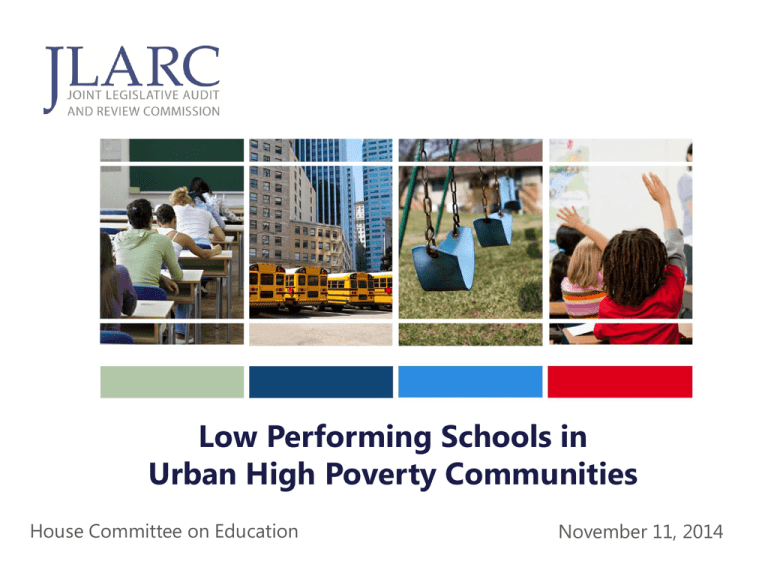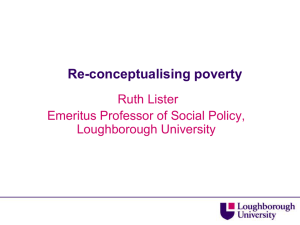Low Performing Schools in Urban High Poverty Communities
advertisement

Low Performing Schools in Urban High Poverty Communities House Committee on Education Commission Briefing November 11, 2014 Study Mandate JLARC to study options for restructuring the lowest performing schools or districts – primary reasons for low school performance – successful approaches for urban high poverty schools in Virginia – options used in other states and cities – appropriate criteria for state intervention For full text see Item 31 of the 2013 Appropriation Act JLARC 2 Research Activities • Analysis of improvement at 47 Virginia schools • Interviews with principals and teachers at 9 urban high poverty schools • Analysis of student achievement and school performance data in Virginia (through 2013) • Review of other states and cities using school takeovers • Review of research literature JLARC 3 In Brief Lower school performance is strongly associated with high poverty, but high poverty schools can perform relatively better with sound instructional practices, effective staff, and support services. The state can facilitate improvement through stronger memoranda of understanding and additional resources and flexibility for low performing schools. JLARC 4 In This Presentation Background Performance of Urban High Poverty Schools Improving Virginia’s Low Performing Schools JLARC 5 Student Achievement Influenced by Community, Family, and Schools JLARC 6 Virginia Schools Must Meet SOL Pass Rates and Graduation Rates for Accreditation Fully Accredited with Accredited Warning SOL English ≥ 75% < 75% Math ≥ 70 < 70 Science ≥ 70 < 70 History ≥ 70 < 70 Graduation index ≥ 85 < 82 • Accreditation denied: school fails to be fully accredited 4 consecutive years JLARC 7 In This Presentation Background Performance of Urban High Poverty Schools Improving Virginia’s Low Performing Schools JLARC 8 Finding Low school performance in Virginia is strongly associated with high poverty. JLARC 9 Poverty Poses Significant Challenges for Virginia’s Urban Students • Students in high poverty schools more likely to − miss school days − change schools during the school year • Poverty cited as significant challenge by teachers and principals − Students regularly come to school unprepared for learning because of difficulties at home JLARC 10 High Poverty Schools Have Lower English SOL Test Scores JLARC 11 Low Performing Schools Often Lack a Sufficient Number of Effective Teachers • 7 of 11 low performing schools reported lacking enough effective teachers • Two challenges with removing ineffective teachers − Time and documentation required for termination − Difficulty recruiting quality teachers JLARC 12 Finding Effective staff, recommended instructional practices, and support services have helped a few urban high poverty schools perform moderately well. JLARC 13 Staff at Higher Performing Schools Use Recommended Instructional Practices • Effective teachers − Regular use of student performance data − Team approach to teaching − Ongoing professional development • Principal serves as instructional leader • Limited turnover among teachers and principals JLARC 14 Higher Performing Schools Provide Support Services to Students • Achievable Dream schools − Partner with local businesses and City of Newport News • Broad range of support services − Character education − Mentoring and monitoring − Medical and personal care services JLARC 15 Finding Prior school improvement efforts in Virginia have had a moderately positive impact. JLARC 16 Low Performing Schools Have Been Subject to State Assistance and Requirements • MOU with Board of Education − Required to implement corrective actions • Restructuring of school (in lieu of MOU) • Federal School Improvement Grant − Required to implement approved reform model JLARC 17 Moderate Improvement, But Most Schools Still Remained Low Performing • About 40% of schools improved relative to the state average • Nearly half of schools were still substantially below the state average score JLARC 18 In This Presentation Background Performance of Urban High Poverty Schools Improving Virginia’s Low Performing Schools JLARC 19 Finding State takeover will not necessarily lead to greater school improvement than past Virginia efforts. JLARC 20 Insufficient Evidence in Most States Whether Takeover Has Been Successful • Lack of sufficient evidence of improvement from older takeover initiatives − New Jersey − Illinois • Some takeovers with state divisions too recent to assess − Tennessee − Michigan JLARC 21 Moderate Improvement in Louisiana RSD, But Similar to Results in Virginia • 44% of Louisiana RSD schools taken over improved relative to takeover average − Nearly half rated “D” or “F” • In both states, moderate improvement in some schools − At most schools subject to improvement efforts, performance remains low RSD = Recovery School District JLARC 22 Finding The state can facilitate improvement without taking over low performing schools. JLARC 23 Accountability for Improving School Performance is Essential • State has constitutional obligation to ensure high quality K-12 education • Ability to exercise greater control over low performing schools is critical JLARC 24 Virginia Has Used MOUs to Support Prior Improvement Efforts • Local school divisions have had final authority • State played more of an advisory role − Consultation on instructional programs and personnel − Provide documentation on planning and actual expenditures JLARC 25 Stronger MOUs Would Compel Better Decisions, But State Role Needs to Be Established • Use VDOE expertise and insight when necessary to require—rather than merely suggest—changes • Binding state authority to override local division on key budgetary, personnel, and instructional decisions • Would require changes to Code and Constitution of Virginia JLARC 26 Recommendations State Board of Education should enter into mandatory MOUs with school divisions that meet criteria for low performance. The General Assembly may wish to consider JLARC - amending the Code to give the Board legal authority for such MOUs - amending the Constitution to provide such authority, subject to voter approval 27 Finding The state can provide additional resources and flexibility to assist low performing schools. JLARC 28 Teachers Can Be Trained Specifically for Urban High Poverty Schools • Teach for America provides short-term solution − Costs local school division up to $5,000 per teacher placed • Urban teacher residency programs provide longer-term solution − Approximately $480K in planning costs and $40K per teacher placed JLARC 29 Recommendations The General Assembly may wish to consider providing grants to local school divisions that place Teach for America teachers in low performing schools. The General Assembly may wish to consider providing grants to higher education institutions and local school divisions to develop teacher residency programs. JLARC 30 Non-Traditional Models Can Improve Instruction and Student Support • Year-round schools • Support services for students in poverty − Achievable Dream model: smaller student body, per- student expenditures ≈ 20% higher • High quality charter schools − Can improve high poverty schools, according to research literature − Requires rigorous evaluation of charter vendors JLARC 31 Key Findings • Lower school performance is strongly associated with high poverty, but high poverty schools can perform relatively better. • Accountability is essential for improving performance; binding MOUs could help. • The state can provide additional resources and flexibility to assist low performing schools. JLARC 32 Final for Report JLARC Staff This Report • Final report posted on JLARC website – http://jlarc.virginia.gov/ http://jlarc.virginia.gov JLARC (804) 786-1258 33








